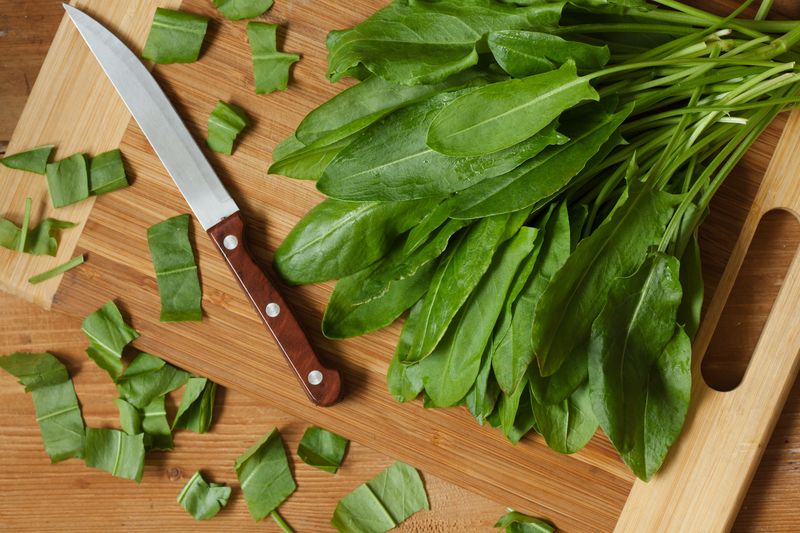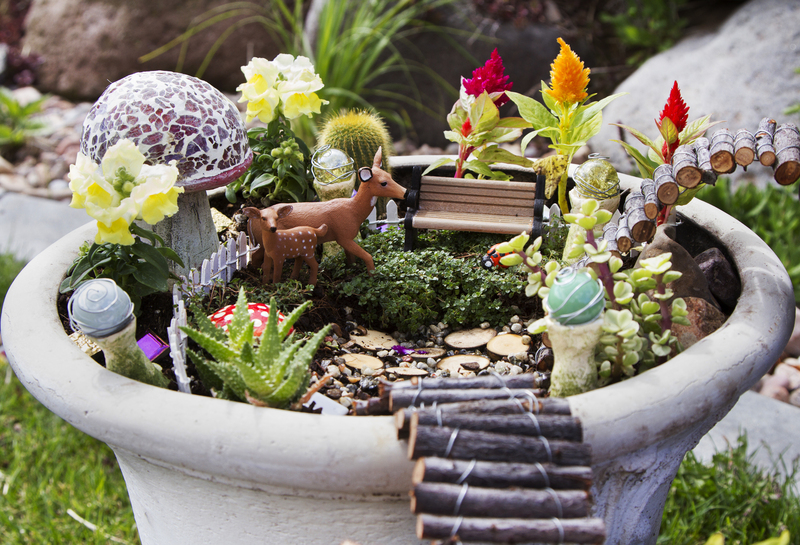Essential Garden Toolkit for the Passionate Botanist
Posted on 08/09/2025
Essential Garden Toolkit for the Passionate Botanist
Every passionate botanist deserves to cultivate thriving, healthy plants and gardens. The secret to their flourishing green sanctuaries? The right toolkit! Whether you're a budding plant enthusiast or an experienced horticulturist, having the best garden tools for botanists at your disposal is the cornerstone of stunning, sustainable gardens. In this in-depth guide, we unveil the essential garden toolkit that no plant lover should be without. Discover expert recommendations for tools and equipment, maintenance advice, and practical tips for building your ultimate gardening arsenal!
Table of Contents
- Why an Essential Gardening Toolkit Matters
- Basic Essential Gardening Tools for Botanists
- Advanced and Specialized Toolkit Items
- Tool Maintenance and Garden Safety
- Must-Have Gardening Accessories
- Eco-Friendly Botanical Tools
- Tips on Assembling Your Garden Toolkit
- FAQs: Botanist Garden Toolkits
- Conclusion: Cultivating Botanical Success
Why an Essential Gardening Toolkit Matters for Botanists
Botanists understand that gardening is both an art and a science. Having the right tools not only streamlines your workflow but also enhances plant health and boosts yields. The right equipment:
- Increases efficiency: Quality tools save time and physical effort, letting you focus on what you love--working with plants!
- Prevents plant damage: Using the correct instrument reduces the risk of injuring roots, stems, or leaves.
- Boosts safety: Well-maintained tools keep you safe from strains, cuts, and repetitive injuries.
- Encourages scientific exploration: Specialty equipment helps you undertake experiments, research, or plant propagation with ease.
If you're serious about botany, building your botanical garden tool set is the first step toward professional-grade plant care.
Basic Essential Gardening Tools Every Botanist Needs
No garden toolkit is complete without these fundamental gardening tools. Whether you tend herbs in containers or maintain large specimen beds, these basics ensure smooth, effective, and enjoyable gardening :
Hand Trowel
The hand trowel is the botanist's best friend. This versatile tool allows for precision planting, transplanting, weeding, and soil sampling. Opt for a sturdy stainless steel trowel with an ergonomic handle for comfort, control, and long-lasting performance.
Secateurs (Pruning Shears)
A sharp, reliable pair of secateurs is indispensable for any botanist. Used for trimming stems, harvesting cuttings, deadheading blossoms, or removing damaged foliage, these shears help maintain plant vigor and shape.
Garden Fork
Perfect for aerating soil, turning compost, and breaking up compacted garden beds, a garden fork ensures optimal root development and healthy soil structure. Choose a fork with robust, rust-resistant tines.
Spade
For digging, edging, or moving soil, a well-made spade is essential for every botanical toolkit. Its sharp, flat blade is great for slicing through sod and roots with minimal effort.
Watering Can or Hose With Adjustable Nozzle
Proper hydration is vital to plant health. A watering can with a fine rose spout or a garden hose with adjustable pressure ensures gentle, even watering--ideal for fragile seedlings or established shrubs alike.
Gardening Gloves
Gardeners frequently encounter thorns, splinters, or irritants. Durable, well-fitting gloves protect hands while offering the dexterity needed for delicate work with cuttings, seeds, or roots.
Weeder
Effortlessly extract unwanted invaders with a specialized weeder. Its narrow, forked blade easily removes deep-rooted weeds, minimizing soil disturbance and maintaining bed health.
Measuring Tape/Ruler
For scientific plantings, propagate with precision using a measuring tape. This ensures accurate spacing--especially crucial for research studies or display gardens.
Spray Bottle
Control humidity for propagations or deliver foliar feeds and organic pest treatments using a fine-mist spray bottle.
- Pro Tip: Always clean and dry hand tools before storage to prolong their life and prevent disease transmission.
Advanced and Specialized Botanical Garden Tools
For the passionately curious botanist, your garden toolkit can go far beyond the basics. These advanced botanical tools help expand your plant collection, support experiments, and contribute to cutting-edge botanical research:
Soil Test Kit
Understanding your soil pH, nutrients, and structure is foundational to professional gardening. A reliable kit lets you analyze soil health and tailor amendments for optimum plant growth.
Botanist's Magnifier (Loupe)
Observation is at the heart of botany. A portable magnifier helps you identify pests, diseases, plant structures, and even pollinators up close and personal.
Plant Labels and Markers
Keep track of species, experimental groups, or propagation attempts by clearly labeling plants. Use weather-resistant tags and permanent markers for durability outdoors.
Seed Organizer
Never lose a precious variety--store, sort, and catalog your seeds with a purpose-built organizer. Some feature compartments for envelopes and germination notes.
Propagation Tray and Dome
Support seedlings and cuttings with controlled humidity and warmth using propagation trays with vented domes. This increases success rates and supports year-round plant multiplication.
Pruning Saw
For large woody stems and branches, a compact folding pruning saw is safer and more effective than shears. Choose one with a hardened blade for clean, precise cuts.
Grafting Knife
Essential for advanced horticultural techniques like grafting and budding, these knives have razor-sharp, thin blades for delicate work.
Soil Moisture Meter
Take the guesswork out of watering by using digital or analog meters to check soil moisture levels. This is especially useful in greenhouses, indoor gardens, or research beds.
Dibber
This pointed wooden or metal tool helps you make uniform holes for planting seeds, tubers, or bulbs, ensuring even growth and easier measurements for studies.
Plant Press
Collect and preserve botanical specimens for study or display. A professional plant press is essential for anyone involved in taxonomy, botany research, or creative plant art.
- Tip: As your passion and garden evolve, upgrade individual tools for better ergonomics or precision--your hands (and plants) will thank you!
Garden Tool Maintenance and Safety
A well-maintained tool is a pleasure to use and lasts a lifetime. Proper care of your garden tools not only saves money but also helps prevent the spread of plant diseases--a key concern for botanists. Here's how to protect your investment:
- Always clean tools after each use with a brush and water or mild detergent. Remove dirt, sap, and debris.
- Disinfect regularly with 10% bleach solution or alcohol wipes, especially when working with diseased or different plants.
- Dry tools thoroughly before storage to prevent rust and corrosion.
- Oil moving parts and sharpen blades as needed. This ensures peak performance and reduces injury risk.
- Store tools in a dry, indoor place--use racks or wall mounts to keep them organized and accessible.
- Wear appropriate PPE: gloves, goggles, and sturdy shoes when working with sharp or heavy tools.
Must-Have Gardening Accessories for Botanists
While gardening tools are the stars, the right accessories can elevate your botanical pursuits:
- Tool Belt or Bag: Keeps essentials handy and organized as you move through beds or greenhouses.
- Kneeling Pad or Garden Kneeler: Protects knees during prolonged work at ground level, enhancing comfort.
- Notebook or Field Journal: Record planting dates, observations, or experimental data. Many botanists treasure these records over years of research and discovery.
- Weather Station or Thermometer: Track conditions in your garden, which is especially useful for microclimate research or sensitive plants.
Eco-Friendly and Sustainable Garden Tools for Botanists
Today's passionate plant lovers care deeply about sustainability. Consider incorporating eco-friendly garden tools made from natural fibers, responsibly sourced wood, recycled metals, or biodegradable materials. Solar-powered gadgets, rainwater harvesters, and compost bins all contribute to a greener gardening footprint.
- Bamboo handled tools: Renewable, lightweight, and durable.
- Natural fiber twine: For staking, tying, or marking without plastic waste.
- Manual rather than electric tools: Lower energy consumption and fewer emissions.
- Stainless or carbon steel blades: Outlast aluminum, reducing replacement frequency.
- Solar garden lighting or irrigation timers: Save power and automate plant care sustainably.
How to Assemble the Perfect Garden Toolkit for a Botanist
Building your essential garden toolkit is a rewarding journey, but it can be overwhelming with so many options available. Here are practical steps for creating your own botanist's gardening toolkit:
- Start with the basics. Invest in quality hand tools before moving to advanced or specialty items.
- Prioritize ergonomics and durability. Test tools for comfort, especially if you garden frequently or have mobility concerns.
- Personalize your toolkit. Customize with items tailored to your unique gardening interests: seeds, edible plants, research, or native plant preservation.
- Organize for efficiency. Use toolboxes, wall racks, or portable caddies for easy access and safekeeping.
- Update regularly. As your expertise grows, adjust your set to keep pace with new challenges or interests.
FAQs: The Essential Garden Toolkit for Botanists
- What's the most important tool for a botanist?
Most experts agree that high-quality pruning shears or a hand trowel are foundational for almost every gardening or botany task. - Should I buy a full toolkit or individual tools?
Individual purchases allow you to customize for quality and specificity. Starter kits can be a budget-friendly way to begin but may lack advanced features. - How often should I clean my tools?
Ideally, after every use! At a minimum, disinfect monthly and after working with diseased plants. - Are expensive tools worth it?
Investing in durable, ergonomically designed equipment often saves money (and frustration) long-term, especially for heavy use. - What are the best brands for botanical garden tools?
Leading global brands include Felco, Fiskars, Burgon & Ball, Sneeboer, and Corona, all renowned for trusted quality.
Conclusion: Cultivating Botanical Success With the Right Toolkit
A passionate botanist's garden toolkit is more than a collection of instruments--it's the key to scientific discovery, creative expression, and healthy, thriving landscapes. Armed with the best essential garden tools, you nurture both plants and your own gardening journey. Take time to assemble and maintain your botanist's toolkit with care. Your plants, research, and sense of fulfillment will reward you season after season.
Ready to elevate your garden? Start assembling your essential garden toolkit for passionate botanists today and watch your botanical adventures bloom!


Latest Posts
Effective Strategies to Winterize Your Garden
How to Design Beautiful and Functional Garden Seating
The Art of Reviving Soil from Organic Waste

